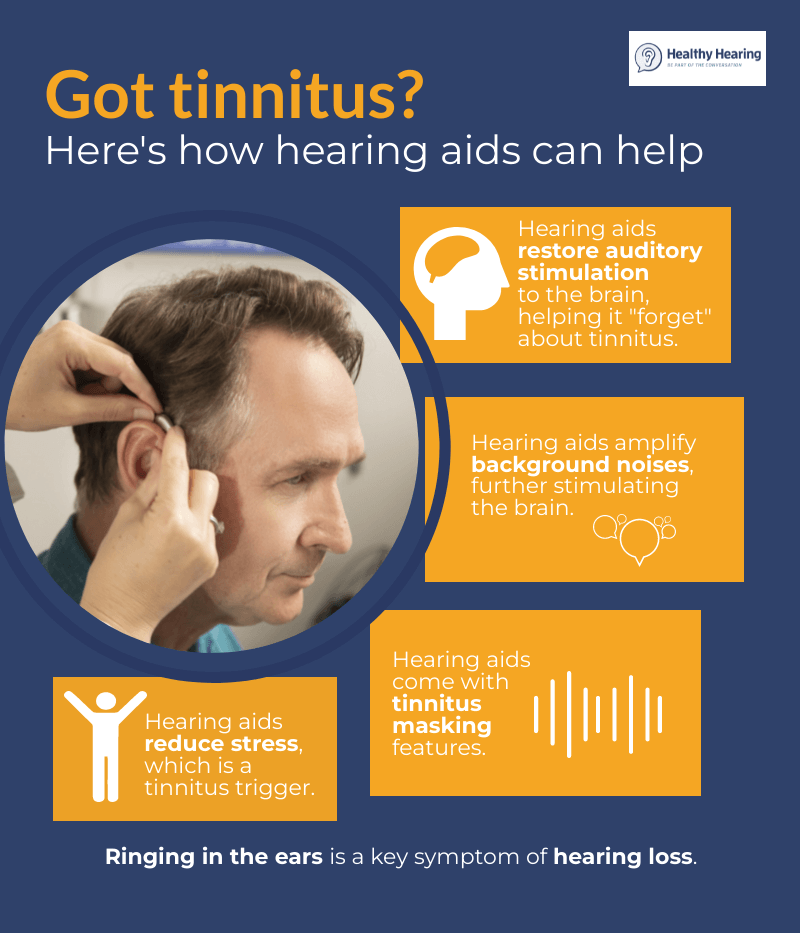|
www.HealthyHearing.com |
Hearing aids for tinnitusFour reasons hearing aids can dampen the ringing in your ears
Contributed by Madeleine Burry Linda Spengler can’t recall a time when she didn’t have tinnitus, or ringing in her ears. “It's the most irritating thing that can happen to you almost because it just interferes with your total life,” Spengler says, describing her tinnitus as an ever-present unpleasant background noise. Many people experience tinnitus. In fact, about 10 percent of the US population experiences tinnitus relatively often. For some people—like Spengler—the condition is chronic.
Spengler felt stuck with the aggravating symptoms of tinnitus—so much so, that she doesn’t think she even remembered to bring it up during a recent hearing test. When Spengler put on her hearing aids in the doctor’s office, she got an unexpected and delightful surprise. “The first minute they put the hearing aids on, the thing that I noticed the most is that the tinnitus is gone,” says Spengler, a retiree in New Mexico. “I can’t even convey to people how wonderful it is,” she says, adding that she thinks hearing aids are the second best invention for older people after cataract surgery. And this wasn’t just a one-time occurrence. The tinnitus disappears every time Spengler puts on the hearing aids, she says. That’s not the case for everyone with tinnitus, but it is somewhat common. Here’s what you need to know about the connection between hearing loss and tinnitus—and why hearing aids can sometimes help alleviate tinnitus symptoms.
Hearing loss and tinnitus often occur togetherHearing loss and tinnitus often go hand-in-hand. Tinnitus is a result of an issue in your brain, not your ears. With hearing loss, you’ll experience missing inputs to your brain, explains audiologist Julie Prutsman, founder of the Sound Relief Hearing Center and board member of the American Tinnitus Association. “In its attempt to restore the missing input, the auditory neurons in the brain become hyperactive and misfire,” Prutsman says. The results: tinnitus, or a phantom sound in the brain—not ears, she says. Why hearing aids can helpThere are a few reasons why hearing aids—and an improved ability to hear—can help lessen the symptoms of tinnitus: Hearing aids restore auditory stimulation to the brainIn a nutshell: Hearing loss makes your brain a bit hyperactive, with nerve cells in the dorsal cochlear nucleus go wild with activity, which may potentially get mistakenly interpreted as a sound. It’s theorized that since hearing aids restore some of the stimulation that the brain has been missing, they may help manage tinnitus. Hearing aids allow you to hear background noisesAnother potential benefit of hearing aids: The restoration of subtle, quiet background noises. “Hearing aids can increase the contrast in the brain to the tinnitus by increasing environmental sounds in the background that the person may be missing, such as a gentle breeze or leaves rustling in the wind,” Prutsman says. Hearing aids may help reduce stressThere are so many things that can cause stress: our work, money, relationships, and so on. Not being able to hear and communicate with people around you is a stresser, too. Spengler’s hearing loss affected her ability to hear high frequency sounds—that means she could tell people were talking, but couldn’t distinguish what exactly they were saying, she recalls. ”I was in a lost world of my own because I didn't understand anybody.... I went around saying ‘What? What?’” Spengler says. Hearing aids have helpful features, tooJust putting in hearing aids often helps reduce tinnitus symptoms. But these devices also have advanced hearing aid features that can help. 
you want to hear. For instance, many hearing aids come with masking features—these are white noise-like sounds (think: rushing water or rain noise). These are known as a tinnitus sound generator (TSG), Prutsman says. With it on, you may find that the buzz, ring, or whoosh of tinnitus is completely covered up. In addition to TSG and masking features, many hearing aids allow you to easily connect to a phone, so you could stream sounds from a relaxation app or one that offers a range of white noises. Other tinnitus treatmentsAnother common strategy for dealing with tinnitus is cognitive behavior therapy (CBT). Tinnitus retraining therapy (TRT), which provides strategies to ignore tinnitus noises, is another treatment option, as well as coping strategies such as relaxation and visualization exercises and meditation. “Since no two people react the same to tinnitus, trying multiple techniques is important to find the ones that help the most,” Prutsman says. Hearing test is important first stepA hearing test is a good first step if you experience tinnitus, since it can rule out medical causes for the condition (such as medications that cause tinnitus as a side effect). To find help, start with our directory of providers. Please note that not all hearing clinics near you will treat tinnitus, so you may need to browse several clinic pages to find the right provider. Madeleine Burry
|
Featured clinics near me
Earzlink Hearing Care - Reynoldsburg
7668 Slate Ridge Blvd
Reynoldsburg, OH 43068

Find a clinic
Need a hearing test but not sure which clinic to choose?
Call 1-877-872-7165 for help setting up a hearing test appointment.



 Madeleine Burry is a Brooklyn-based freelance writer and editor. She's written about health for several online publications, including Women's Health, Prevention, Health, Livestrong and Good Housekeeping. You can follow her on Twitter @lovelanewest.
Madeleine Burry is a Brooklyn-based freelance writer and editor. She's written about health for several online publications, including Women's Health, Prevention, Health, Livestrong and Good Housekeeping. You can follow her on Twitter @lovelanewest.